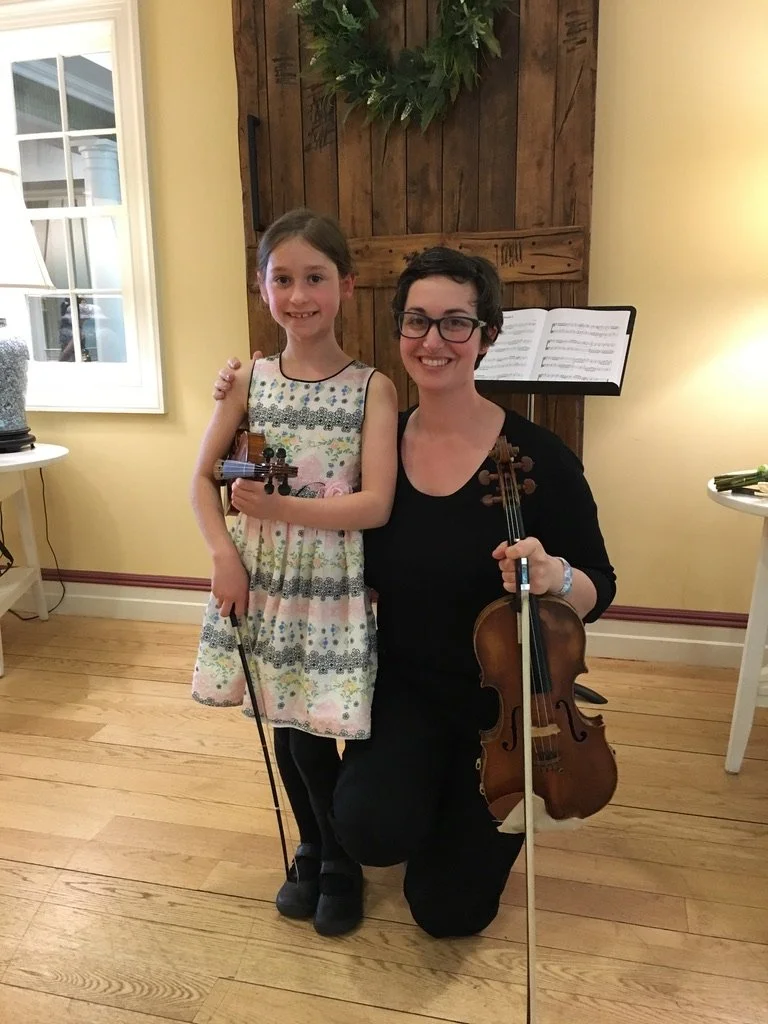Individualized attention is the cornerstone to success.
I believe that students succeed the best when they have attention directly focused on their strengths and weaknesses. In group lessons, small details may not be able to be addressed on an individual basis so private lessons are very important to fostering great technique which will allow students the ability to accomplish large goals on their instrument. By having private lessons weekly, students and parents gain motivation and direction and we all stay on the same path. Daily practice supports the work accomplished in private lessons and helps students to accomplish short and long term goals.
Goals
Most students do not enroll in lessons in order to become a concert violinist. Most parents don't enroll students in lessons so they can become concert violinists. My goal is to create a life long love for music and learning in my students and boost confidence in violin and learning. I love to support young violinists goals that they set for themselves as well. I have had students join jazz ensembles at school, enter fiddle competitions, and even raise money with their music. There are many things that students learn besides how to play the violin in lessons including tenacity, dedication and discipline. Our goal together should be not just to have a beautiful violinist in front of us, but a beautiful heart. That being said, I am happy to help students prepare for auditions and college should they choose to pursue music as a career.
Expectations
In lessons, students are expected to be respectful to both parent and teacher and to try their best. I will create small steps to make each goal possible to accomplish. Parents are expected to be present in the lesson and take notes. My job is to help you discern what will be needed at home and help you to learn how to help your student. Do not worry if you have no musical experience! You are not alone. As students become more mature, they may take over much of the responsibility in their lesson. Parents are expected to support students at home in their practice. This can be a wonderful bonding experience for parent and child!
In the Suzuki Method of learning, children begin as soon as they are ready. Readiness can be determined by a teacher in an observation of another student's lesson or in a trial lesson. If a student is able to focus on one activity for ten or fifteen minutes and is expressing interest in learning violin, that is often a good point. Some students are ready at three, some are ready at five. In my experience, almost everyone is ready by the age of seven.
Students usually learn to play the violin before they learn to read music. This solidifies technique and takes away too much multitasking at the start of their learning process. If their technique is ready, they will learn to read music around the same time they learn to read words. If they are already reading well, they will learn to read music once their technical foundation is solid. There is a myth that Suzuki students do not read music. This is simply not true and my students will learn to read well and will be able to participate in orchestras, chamber music, and all other activities where they may need to read music.
Often, the first lessons are focused on how to hold the instrument well. This foundation is crucial for producing the best possible sound as early as possible and for setting students up for long term success. Please make a semester long commitment so you can really see the careful progress that can only happen over time.
I welcome siblings and others! However, if you know the sibling to be disruptive, you may wish to make alternative arrangements or bring activities for them during the lesson. We want students to be able to concentrate on the important work they are doing in their lesson and we want the support at home to be as easy as possible. If there is too much distraction for student or parent, the home practice becomes challenging because the message from the lesson may not make it home clearly.
Students should practice daily at home as well as attend group classes. In my experience as a teacher, students that practice daily often have less fuss about practicing while students that practice intermittently sometimes try to bargain. As Dr. Suzuki said, "Only practice on the days you eat!"
